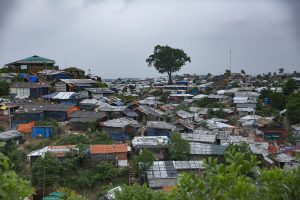The Indonesian government has relented and allowed a ship carrying around 120 Muslim Rohingya refugees from Bangladesh to land on its shores, following an outcry from the United Nations refugee agency and human rights groups. The boat had drifted off the coast of Aceh, on the island of Sumatra, since it was spotted on December 26, and the authorities had initially announced their intention to push the boat, which was carrying mostly women and children, back into international waters.
According to the Associated Press, the authorities reversed course because of the severe conditions on board. “The Indonesian government has decided, in the name of humanity, to accommodate the Rohingya refugees currently adrift at sea near Bireuen district,” said Armed Wijaya, who heads a refugee task force at Indonesia’s Coordinating Ministry for Political, Law and Security.
More than a million Rohingya have fled their homes in western Myanmar over the past decade, most of them in 2017, when the country’s military launched a brutal “clearance operation” in Rakhine State, sweeping more than 600,000 people across the border into Bangladesh. Throughout this period, the Rohingya have boarded leaky and overladen vessels in an attempt to find sanctuary elsewhere in Southeast Asia, particularly in the Muslim-majority nations of the region.
With Malaysia and Thailand taking an increasingly inhospitable line toward arrivals, especially since the onset of the COVID-19 pandemic, Aceh has established itself as a relative sanctuary for Rohingya refugees. This happened most recently in June, when a boat carrying 81 people landed in East Aceh, after drifting for more than 100 days at sea, and followed several similar incidents in 2020.
Aceh’s welcoming stance is partly due to its relative proximity to Myanmar and Bangladesh, but also reflects the region’s Islamic solidarity and its system of customary maritime law, which has prompted Acehnese fishermen to aid distressed boats and tow them to shore.
This was the case with the boat that arrived this week, which was first sighted by fishermen about 96 kilometers off the coast of Bireuen, the Associated Press reported. The news agency quoted Badruddin Yunus, the leader of a local tribal fishing community, as saying fishermen were unable to tow the broken-down wooden boat but provided food, water, and clothes to the passengers.
At the same time, the Indonesian central government has generally been more wary of allowing refugee boats to land, and Acehnese fishermen have often faced resistance from Indonesian authorities. In the case of the boat that landed in June, local police reportedly urged refugees to return to their boat and leave Indonesian waters, before relenting.
Similarly, in this week’s case, the first response of the central government was to turn it away. In a statement Tuesday responding to the announcement, UNHCR said that the boat “reportedly is leaking and has a damaged engine, is floating in the open seas in the middle of harsh weather and may be at risk of capsizing.” It added, “To prevent needless loss of life, we strongly urge the Indonesian Government to allow safe disembarkation immediately.”
Indonesia’s ad hoc acceptance of vessels carrying Rohingya refugees reflects the fact that the country is not a signatory of the 1951 Refugee Convention, meaning that even those who manage to reach its shores are not permitted to work or resettle in the country permanently.
In December 2016, President Joko Widodo signed a presidential regulation concerning the handling of refugees, which went some way to filling the regulatory vacuum. According to an analysis of the regulation by the Centre for Indonesian Law, Islam, and Society at the University of Melbourne Law School, the regulation “makes some progress in regard to rescuing refugees in emergency situations,” but “still lacks substantial commitment to the effective protection of refugees.”
“Rather than offer any durable solution for asylum seekers and refugees staying on in Indonesia,” the analysis concluded, the current policies created s state of “permanent temporariness” for refugee populations in Indonesia.
The willingness of the Indonesian authorities to welcome distressed boats carrying refugees, even under pressure from the U.N., is no doubt something that should be welcomed. But given that the Rohingya refugee crisis shows little sign of ending any time soon, and that Indonesia is likely to remain a destination of choice for those fleeing seeking asylum abroad, its government urgently needs a more cohesive and comprehensive solution.

































